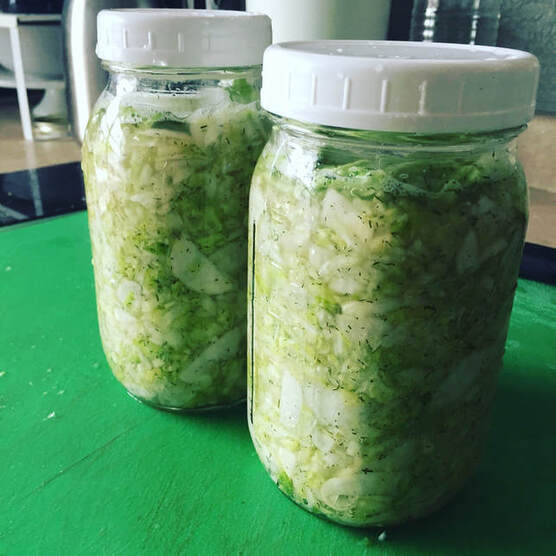Probiotics Are Not One-Size-Fits-AllProbiotic supplements and foods (i.e., fermented foods) can be key in helping improve the microbiome, leading to better gut function and overall better health. However, one common mistake I often see in those looking to improve their gut health is not knowing how to select the right probiotic. It can be hard to know which one to buy, leading many people will grab whatever probiotic is cheap or seems "good enough," expecting this to be a magic bullet for gut health. Unfortunately, not all probiotics are created equal, both in quality and ingredients, and it is important to know how to pick the right probiotic for your own unique body so you can maximize their benefits. These are not one-size-fits all supplements and I want to let you in on how to select the right probiotic for you. As Always, Start with FoodBefore diving into probiotic supplements, I want to address probiotics in the diet. As a food-focused dietitian, I like to emphasize food first (over supplements) to help support a healthy microbiome--this would include probiotic-rich fermented foods like sauerkraut, kim chi, yogurt, kefir, kvass, and kombucha, which contribute beneficial bacteria and yeasts to the body along with enzymes, prebiotic fibers and post-biotic digestion support. Consuming probiotic foods as well as fiber-rich foods like vegetables, fruits, beans, nuts and whole grains, can help to create a diverse and robust microbiome, without having to add a supplement. For many healthy people, starting with a nutrient-dense diet, choosing organic foods whenever possible, avoiding processed sugars, flours and oils can often be a good start to creating a healthy microbiome. Additionally, getting plenty of exercise and sleep, addressing stress and spending time in nature while avoiding chemicals in personal care products, cosmetics, cleaning supplies and more, can all support the microbiome in addition to a good diet. If you can adopt these diet and lifestyle principles as a starting off point, you will likely see an improvement in your gut health and overall wellbeing. While using foods to support the microbiome is great for generally healthy people, in certain situations, adding therapeutic doses of probiotic supplements can be beneficial. Some people with sensitive digestive systems don't tolerate fermented foods, such those with FODMAP or histamine intolerances, and supplements can help add beneficial microbes to the body in place of these foods. Who Can Benefit From Probiotic Supplements?Since having a robust, diverse microbiome is one of the most important foundations of good health--from gut health, to immune function, and even mood and mental health--probiotic supplements can be beneficial in many situations, and can be an important part of a healing protocol. Beneficial bacteria, yeasts and other microbes in the body (our microbiota) have numerous jobs, and we are only truly beginning to understand the myriad ways they promote good health. Beneficial bacteria help maintain the integrity of the gut lining (helping to prevent gut permeability, aka "leaky gut"), create healthy mucous membranes, facilitate the digestion and absorption of food, promote regularity of the bowels, help create digestive enzymes, and promote bile flow. Along with these gut and digestive functions, commensal bacteria also promote respiratory and dental health, protect the body from pathogens, play a role in immune function, help with weight management and blood sugar control, help produce neurotransmitters (serotonin, dopamine, GABA, etc.) to support mental health, decrease the likelihood of allergies and food intolerances, and even take part in the production of some nutrients like vitamins B12 and K2, and short-chain fatty acids like butyrate. So, if you have digestive ailments or other health issues that may be improved with a stronger, more diverse microbiome, then adding in probiotic foods or supplements might be beneficial for you. What to Look for in a Probiotic SupplementIt can be confusing and overwhelming to select a probiotic supplement, and you want to be sure you are getting what you are paying for. My primary advice is to do as much research as you can before selecting and buying your product, as your average "grocery store" probiotic may not provide the benefits you desire or expect. Here are some of the important things to consider when selecting a probiotic: Species and Strain Specificity First, I will start with a brief intro about the taxonomy of probiotics. The genus refers to the general "family" of the probiotic, such as lactobacillus, Bifidobacterium, or bacillus. The species is a more specific description of the bacteria (what most people are familiar with in probiotic names), such as lactobacillus rhamnoses. The most specific descriptor of a microbe is the strain (such as Saccharomyces boulardii I-745), which is the subtype of the species and gives the best indication of how this might benefit the user. When choosing a probiotic supplement, I believe the most important thing to look for is picking the right species and strains of bacteria (or yeast) tailored to your specific health needs. This is important if you are looking to address specific symptoms or health conditions, as different species and strains have been shown to benefit different situations, while others have no research to support their use in different situations. Getting specific about species and strains can also help to not worsen symptoms in some cases as well. For example, some people who have IBS or SIBO (small intestinal bacterial overgrowth) do not do well with some strains, and may even have symptoms worsened with some strain, while needing to use other strains in order to improve their symptoms. This is a key reason why probiotics are not one-size-fits-all! Each species and, more importantly, strain of beneficial microbes has a different role in the body, so using the right microbe to help you is essential. Always carefully read the label to see which species and strains are included in the supplement. Do your research to determine what these strains have been shown to benefit certain conditions(or not)--the more information a label gives on species and strains it contains, the better. If the strain is not listed on the label, reach out to the manufacturer to gather more information and make the most informed decision you can. I tend to recommend different probiotic strains for different health conditions, as some species and strains have been clinically proven to benefit certain conditions, but not for others. Doing your research and working with a practitioner before taking (and paying for!) a supplement ensures you get the right microbes, or combination of microbes, to actually help you reach your health goals. Diversity In addition to specific strains and species, I also typically recommend supplements with multiple strains in it, helping to promote the most diversity possible and attempt to confer the most benefit to digestive function and other health outcomes. While the most strains in a supplement may not necessarily mean it will provide more benefit, I do like to see some variety and diversity of (evidence-based) strains in a probiotic supplement. There is much debate about whether probiotic supplements actually colonize the gut or not, but we do know that they provide benefit to digestive function, immune function, and other health markers, so adding many types of beneficial microbes is important, even if they only provide these benefits transiently. Guaranteed Potency and Clinical Results Good companies have transparency, guarantee high potency in their products, and back up their products with clinically-proven results. Many products will include a guarantee of potency, so look for this on the label to be sure that as many of the microbes are still potent and viable when you buy it off the shelf as possible. Seeing "clinically tested" strains on the label and brands with third-party testing and certification is also a good sign as well. Again, if you do not see these types of information on the labels, reach out to the company to inquire further. If they can give you this information, great, but if not, move on to another company that provides more transparency. CFU (Colony Forming Units) Many people primarily focus on CFU (the number of microbes present in the supplement) when picking a probiotic. Our culture tends to fixate on "the more, the better," but this may not apply to probiotic supplementation; a super-high CFU count is not typically something I emphasize, as I feel quality and strain-specificity are more important than quantity. I don't see a lot of evidence for higher CFU counts having more benefit to the gut, so getting hung up on this marker may be a waste of time. Look for a supplement with a CFU in the several billions, but focus your probiotic search much more closely on strains and quality. Additives and "Other" Ingredients When you read the label of your probiotic supplement, look for additives or allergens in the capsules that may not work for your body, especially if you have sensitivities or dietary restrictions. Some strains are grown using soy or dairy, and may need to be avoided for those with allergies. Many probiotic manufacturers are adding other ingredients to amend the probiotic part of the supplement, such as prebiotic fibers, enzymes, or herbs. While these may be beneficial for some, others may not react well to added ingredients (such as prebiotics), so read your labels to look for these "extras." Also, fillers that are commonly used in capsules may cause GI distress or other reactions, so look at the inactive ingredients before using supplements as well. As a side note, I do want to caution us to avoid thinking of probiotics in the same way that modern, allopathic medicine views treatments; the goal of these foods and supplements is to provide us beneficial microbes in the gut and improve digestive function, immune function and more. So, while I like to use strains and species that have been proven in studies to benefit different health conditions, they are not "cures" and adding these strains is not the only step in creating better health, rather, are one of many layers of improving health. That is where working with a practitioner comes in! Working With a Provider to Select Your Probiotic and Improve Gut HealthWhile being empowered to improve our own health is an important principle, there are times where working with a provider can be a part of that self-empowered picture. I always recommend working with a healthcare practitioner (or even a team of them) to find out which probiotic supplements and dietary changes may help support your gut health or other health condition. One of the reasons for this is unintended side effects. As mentioned above, some don't tolerate probiotic supplements, whether at high doses or with certain strains, which is part of the reason I don't recommend adding a probiotic supplement across the board. Some people need to avoid these supplements altogether, such as those with compromised immune systems or with certain digestive conditions, which is a big reason why working with a practitioner is better than assuming a certain supplement will be beneficial or appropriate. Another reason is that a practitioner can help take the guess-work out of your treatment plan. They can order tests, such as stool testing, to determine where there are imbalances and what supplements may be therapeutic . A practitioner can help with your research into clinical studies on strains for various conditions, as well as address overgrowth and other factors contributing to GI symptoms. Lastly, working with a practitioner helps to view the microbiome and the body as a whole, working with you on a comprehensive plan--remember, probiotics are not magic bullets! We must support the body with a good diet and healthy lifestyle practices, treat overgrowth of unwanted microbes and address inflammation and gut permeability to help create a healthy gut environment and diverse microbiome. We also must ask the question of why and how the gut was allowed to become imbalanced in the first place. Using the extra support from supplements can be beneficial-but they are not a cure-all for better gut health and certainly must be a part of a comprehensive healing protocol. If you have a certain digestive or other health conditions you feel may be improved with adding in probiotics, do your own research, talk to a provider to find the right species and strains for your body (or to see if a probiotic is even right for you) and to help improve your microbiome through diet and lifestyle. Want Help on Your Healing Journey?If you feel you may need some help in selecting the right probiotic for you and could use some guidance in your gut-healing journey, then please reach out!
Go to my website, www.laurapoerd.com, to set up a FREE 15-minute consult or book a package to get started on healing your gut.
1 Comment
6/23/2021 06:04:40 am
The post you shared here is very informative. Thanks for sharing such a great post with us.
Reply
Leave a Reply. |
Brine & Broth
I am a gut health-focused nutritionist and online health coach based in Southwest Wisconsin. My recipes and philosophies center around traditional, nutrient-dense foods that support robust gut health. Archives
May 2022
Categories |





 RSS Feed
RSS Feed
